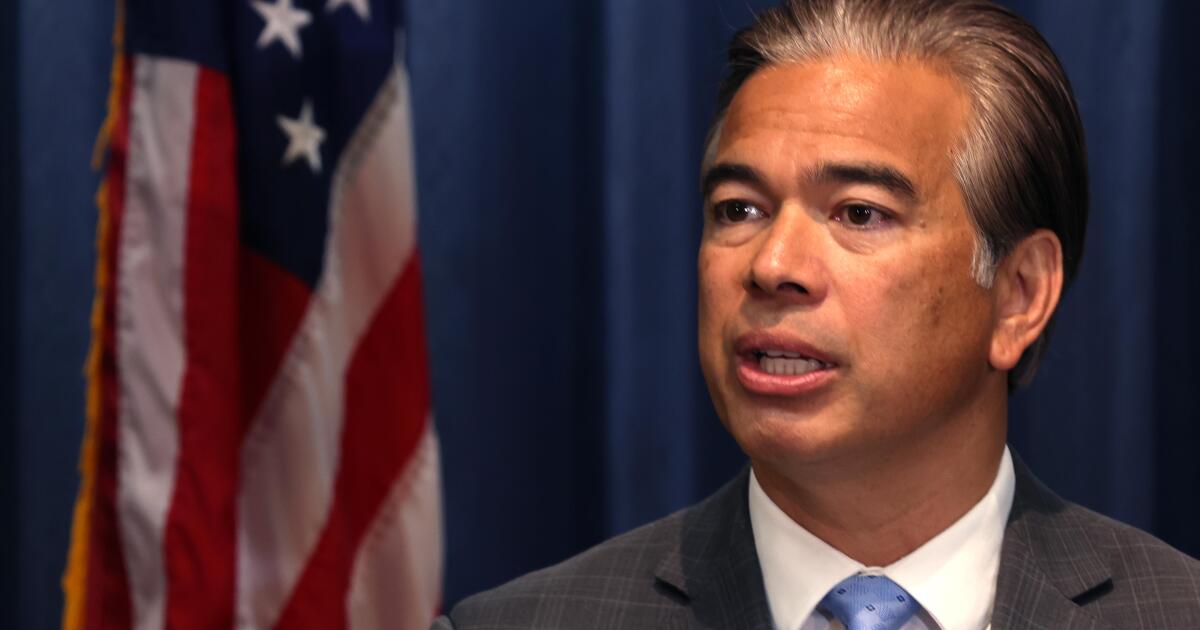California Atty. Gen. Rob Bonta opts against running for governor. Again
California Atty. Gen. Rob Bonta announced Sunday that he would not run for California governor, a decision grounded in his belief that his legal efforts combating the Trump administration as the state’s top prosecutor are paramount at this moment in history.
Bonta said that President Trump’s blocking of welfare funds to California and the fatal shooting of a Minnesota mother of three last week by a federal immigration agent cemented his decision to seek reelection to his current post, according to Politico, which first reported that Bonta would not run for governor.
“Watching this dystopian horror come to life has reaffirmed something I feel in every fiber of my being: in this moment, my place is here — shielding Californians from the most brazen attacks on our rights and our families,” Bonta said in a statement. “My vision for the California Department of Justice is that we remain the nation’s largest and most powerful check on power. We aren’t just defending the status quo; we are securing the California Dream for the next generation. Let’s finish what we started – together.”
Bonta, 53, a former state lawmaker and a close political ally to Gov. Gavin Newsom, has served as the state’s top law enforcement official since Newsom appointed him to the position in 2021. In the last year, his office has sued the Trump administration more than 50 times — a track record would likely have served him well had he decided to run in a state where President Trump has lost three times and has sky-high disapproval ratings.
Bonta in 2024 said that he was considering running. Then in February he announced he had ruled it out and was focused instead on doing the job of attorney general, which he considers especially important under the Trump administration. Then, both former Vice President Kamala Harris and Sen. Alex Padilla (D-Calif.) announced they are not running for governor, and Bonta began reconsidering a run, he said.
“I had two horses in the governor’s race already,” Bonta told The Times in November. “They decided not to get involved in the end. … The race is fundamentally different today, right?”
The race for California governor remains wide open. Newsom is serving the final year of his second term and is barred from running again due to term limits. Newsom has said he is considering a run for president in 2028.
Former Rep. Katie Porter — an early leader in polls — late last year faltered after videos emerged of her screaming at an aide and berating a reporter. The videos contributed to her dropping behind Riverside County Sheriff Chad Bianco, a Republican, in a November poll released by the UC Berkeley Institute of Governmental Studies and co-sponsored by The Times.
Porter rebounded a bit toward the end of the year, a poll by the Public Policy Institute of California showed, however none of the candidates has secured a majority of support and many voters remain undecided.
California hasn’t elected a Republican governor since 2006, Democrats heavily outnumber Republicans in the state, and many are seething with anger over Trump and looking for Democratic candidates willing to fight back against the current administration.
Bonta has faced questions in recent months about spending about $468,000 in campaign funds on legal advice last year as he spoke to federal investigators about alleged corruption involving former Oakland mayor Sheng Thao, who was charged in an alleged bribery scheme involving local businessmen David Trung Duong and Andy Hung Duong. All three have pleaded not guilty.
According to Bonta’s political consultant Dan Newman, Bonta — who had received campaign donations from the Duong family — was approached by investigators because he was initially viewed as a “possible victim” in the alleged scheme, though that was later ruled out. Bonta has since returned $155,000 in campaign contributions from the Duong family, according to news reports.
Bonta is the son of civil rights activists Warren Bonta, a white native Californian, and Cynthia Bonta, a native of the Philippines who immigrated to the U.S. on a scholarship in 1965. Bonta, a U.S. citizen, was born in Quezon City, Philippines in 1972, when his parents were working there as missionaries, and immigrated with his family to California as an infant.
In 2012, Bonta was elected to represent Oakland, Alameda and San Leandro as the first Filipino American to serve in California’s state legislature. In Sacramento, he pursued a string of criminal justice reforms and developed a record as one of the body’s most liberal members.
Bonta is married to Assemblywoman Mia Bonta (D-Alameda), who succeeded him in the State Assembly, and the couple have three children.
Los Angeles Times reporter Dakota Smith contributed to this article.
